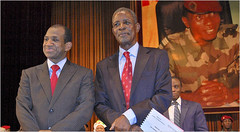
Guinea opposition leaders were appointed to positions in government following a massacre last year that killed over 150 people. Jean-Marie Dore, right, standing with his predecessor, Kabina Komara. The government banned demonstrations after the elections.
Originally uploaded by Pan-African News Wire File Photos
Reuters
CONAKRY--Guinea's caretaker government banned street marches called on Monday to protest against alleged fraud in the country’s landmark presidential poll, now set for a run-off between the two
front-runners.
Former Prime Minister Cellou Dalein Diallo won June 27's poll with
nearly 40 percent of the vote and will now go forward into a July 18
head-to-head with second-placed Alpha Conde, according to provisional results released last week.
But losing parties in the poll, widely seen as the West African
state’s best chance in half a century of securing democratic civilian
rule, said they have evidence of rigging such as ballot-stuffing and
falsified voters' cards.
"I will not accept any public order disturbance by people contesting
things for which they have no proof and while the Supreme Court has
not pronounced its verdict," caretaker prime minister Jean-Marie told
state television late on Sunday.
Candidates have eight days from Monday to lodge formal complaints with the Supreme Court, which will then rule on the validity of the
election within three days.
A Reuters eyewitness said there was no evidence of crowds forming in
the capital Conakry.
The party of third-placed Sidya Toure, a former prime minister, is
among those who called rallies in the central Kaloum district for
Monday.
Election observers from the European Union and the Carter Center said they were broadly satisfied with the vote, while noting irregularities
caused by logistical problems.
Guinea is the world's top exporter of the aluminium ore bauxite and a
handful of mining firms are currently jockeying for position to
exploit its iron ore resources.
A smooth poll would help draw a line under a turbulent 18 months of
military rule since the death of President Lansana Conte in 2008 and
open the door to further aid and investment.
Yet analysts point to the culture of decades of mismanagement in the
civil administration and warn that efforts to build the economy and a
functioning political system could take years and require
international help.
The Guinean army, with a reputation for poor discipline that was
reinforced last September when security forces massacred pro-democracy marchers in Conakry, has maintained a discreet security presence during and since Sunday's election.
Sekouba Konate, the soldier who took control of the country after
former junta leader Moussa Dadis Camara was wounded in an
assassination attempt late last year, has issued a batch of promotions
to army officers for their part in securing the poll. — Reuters.
No comments:
Post a Comment